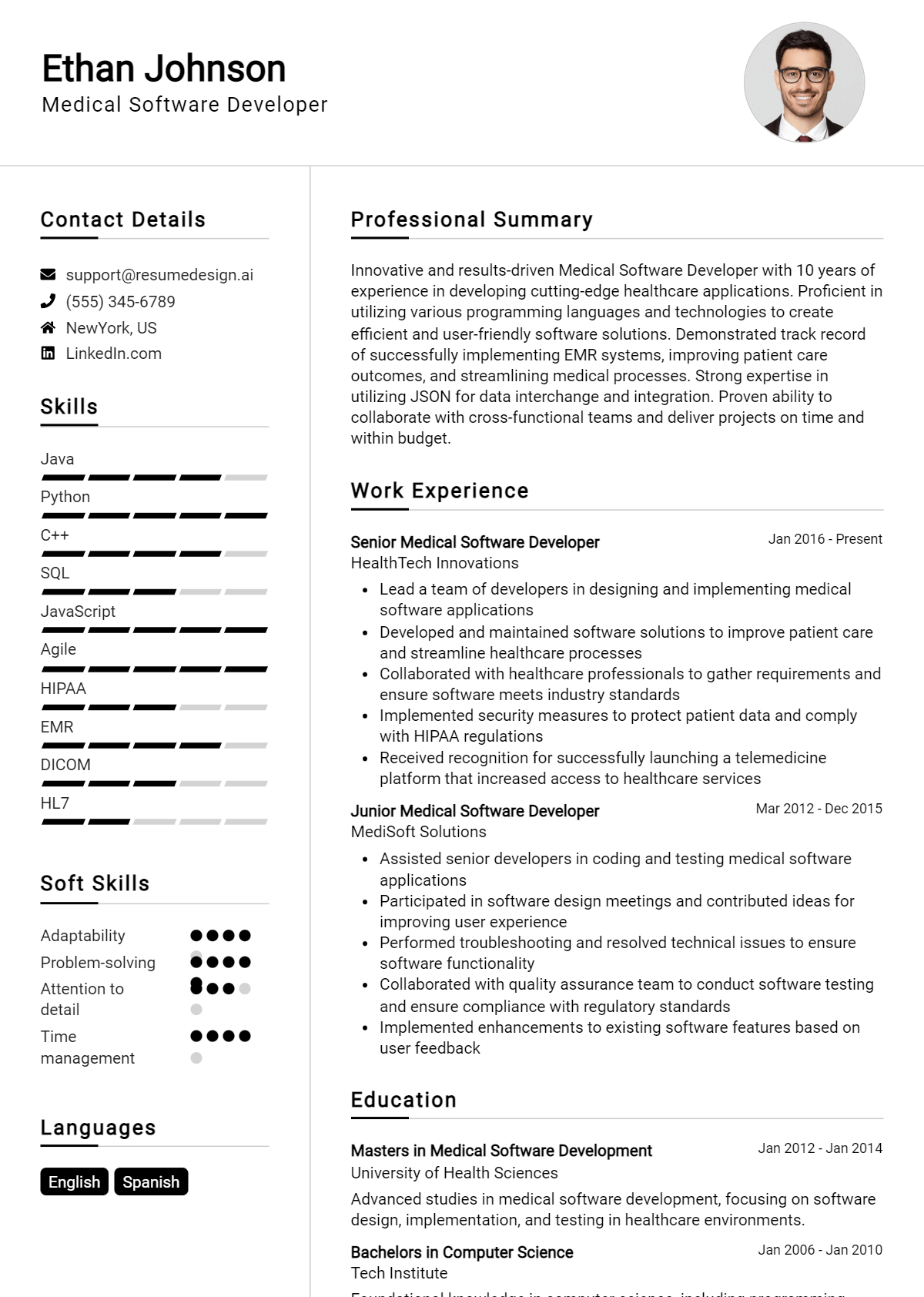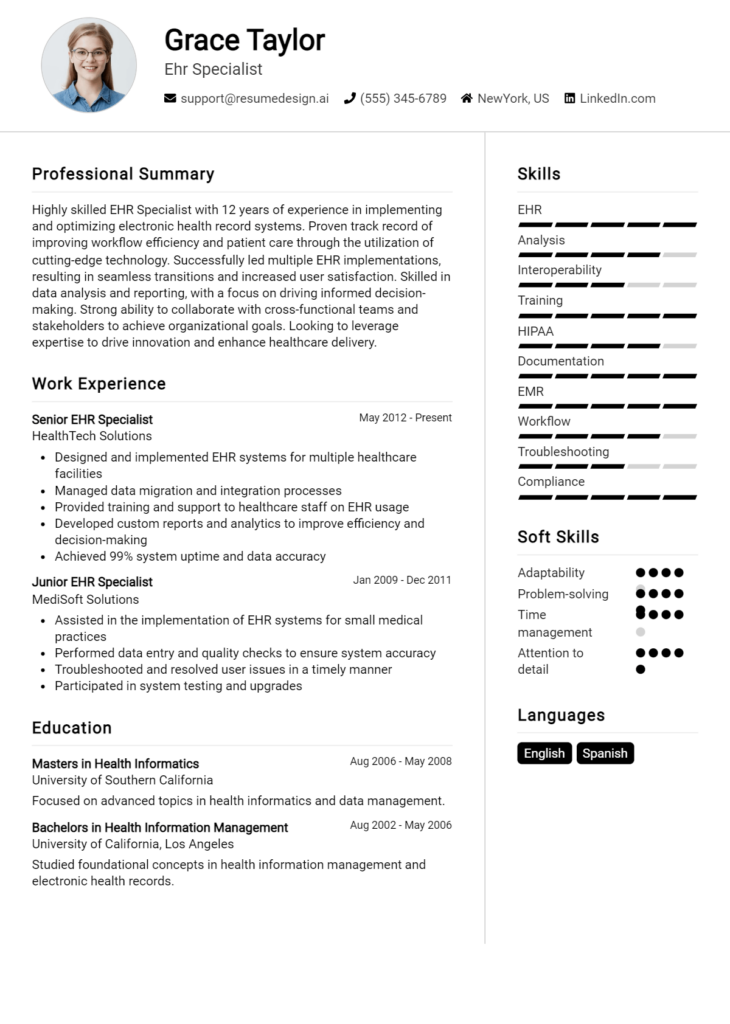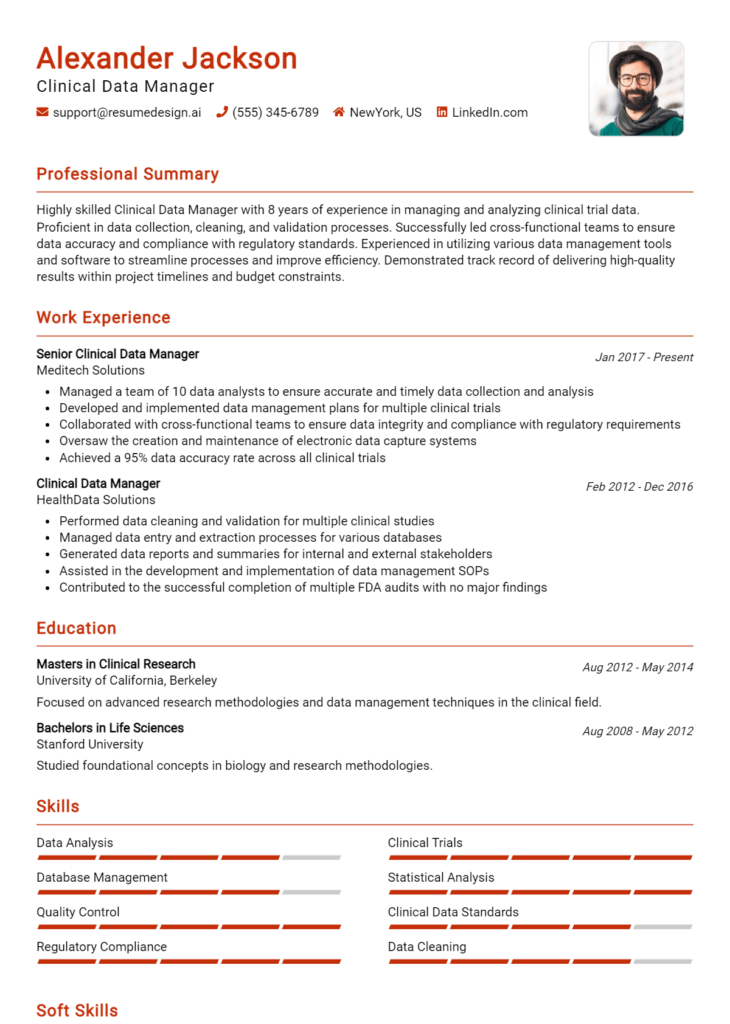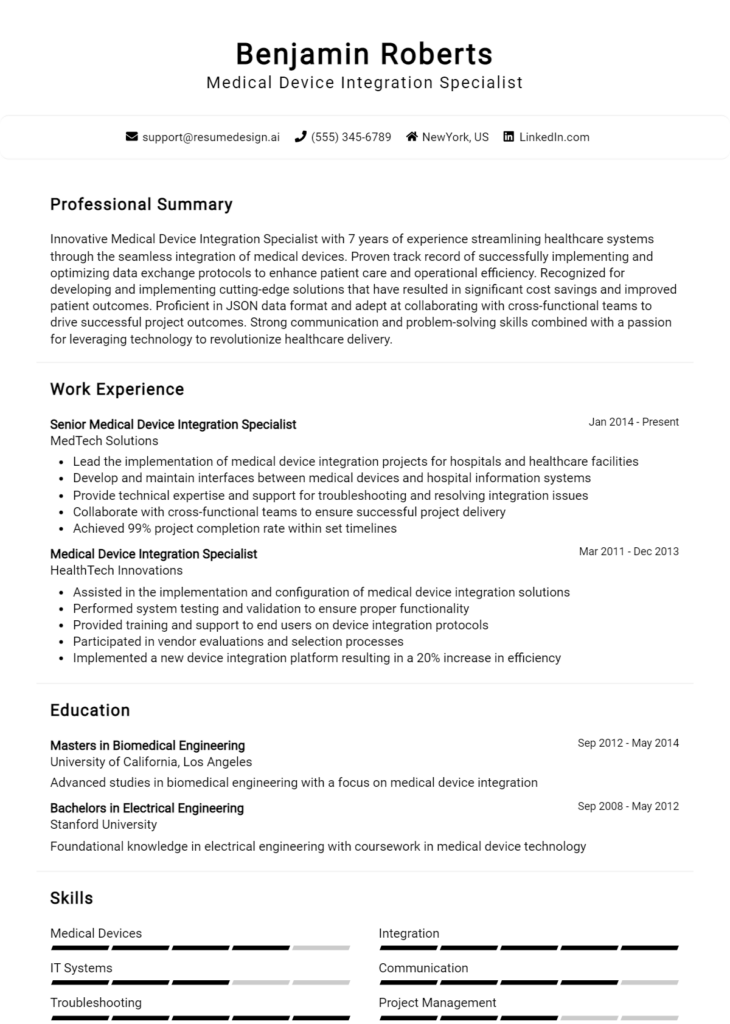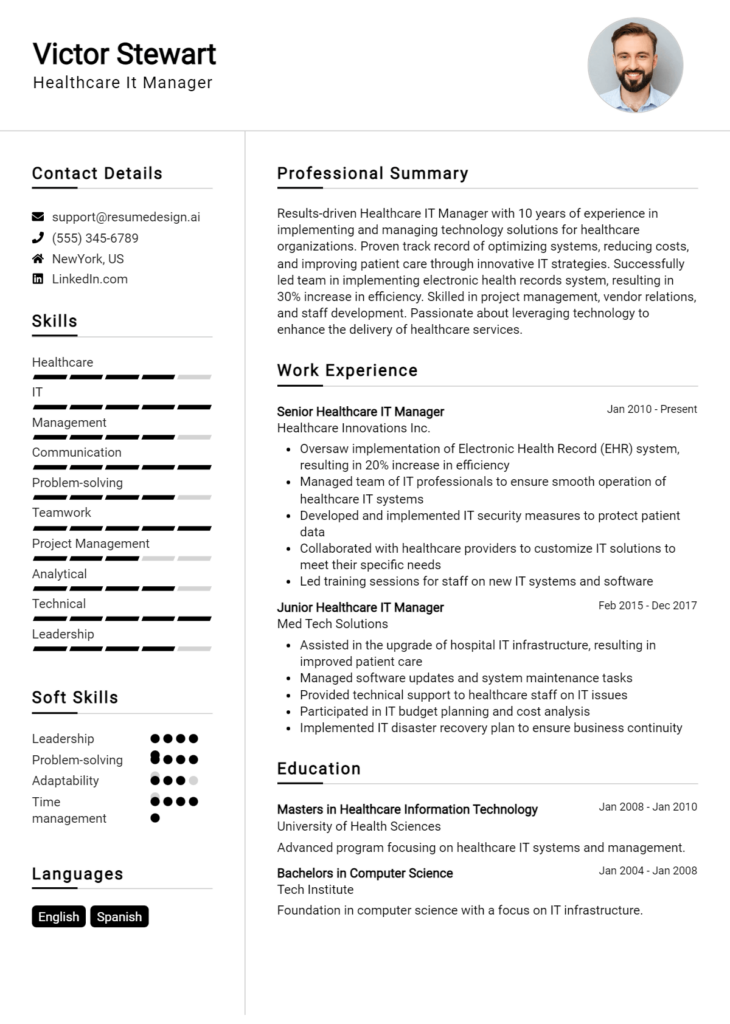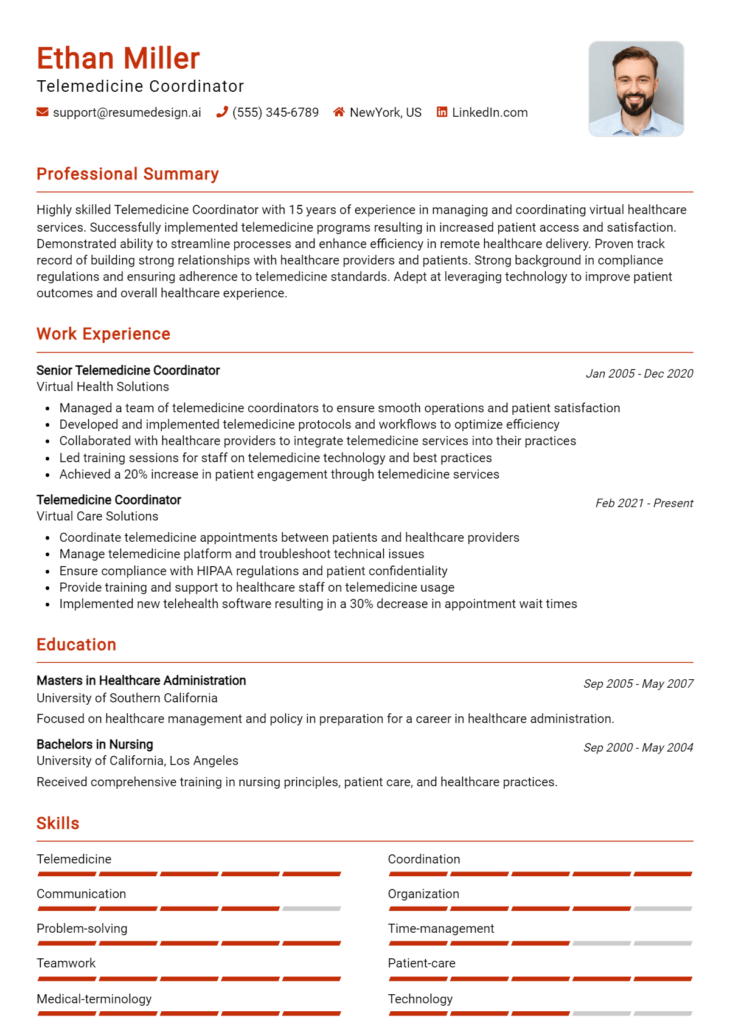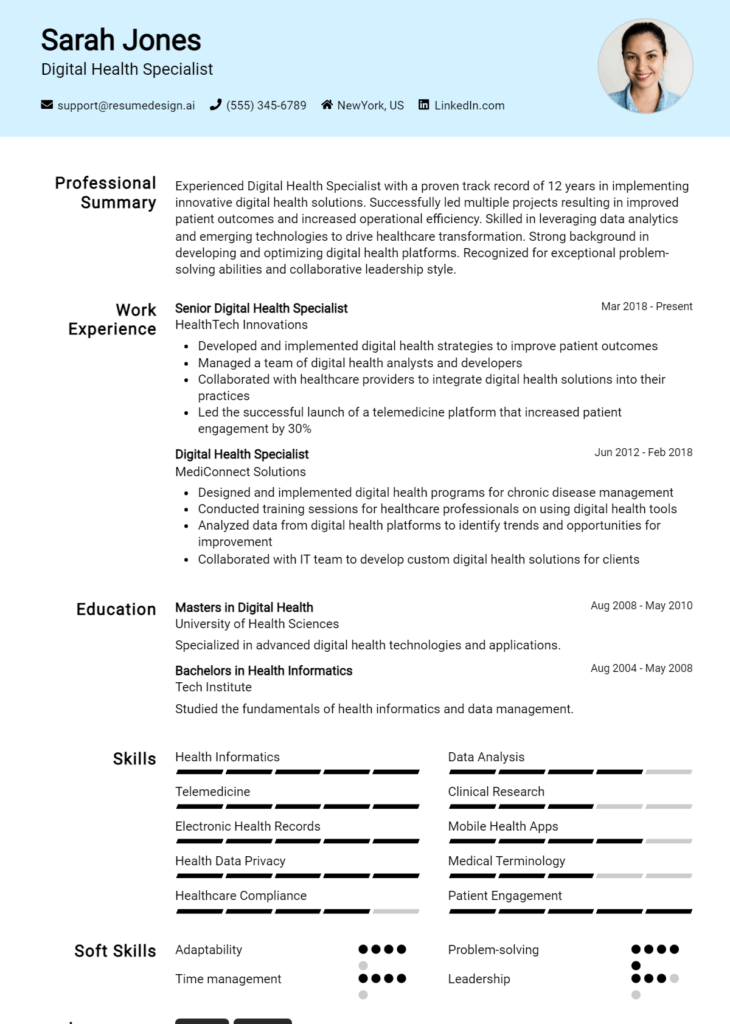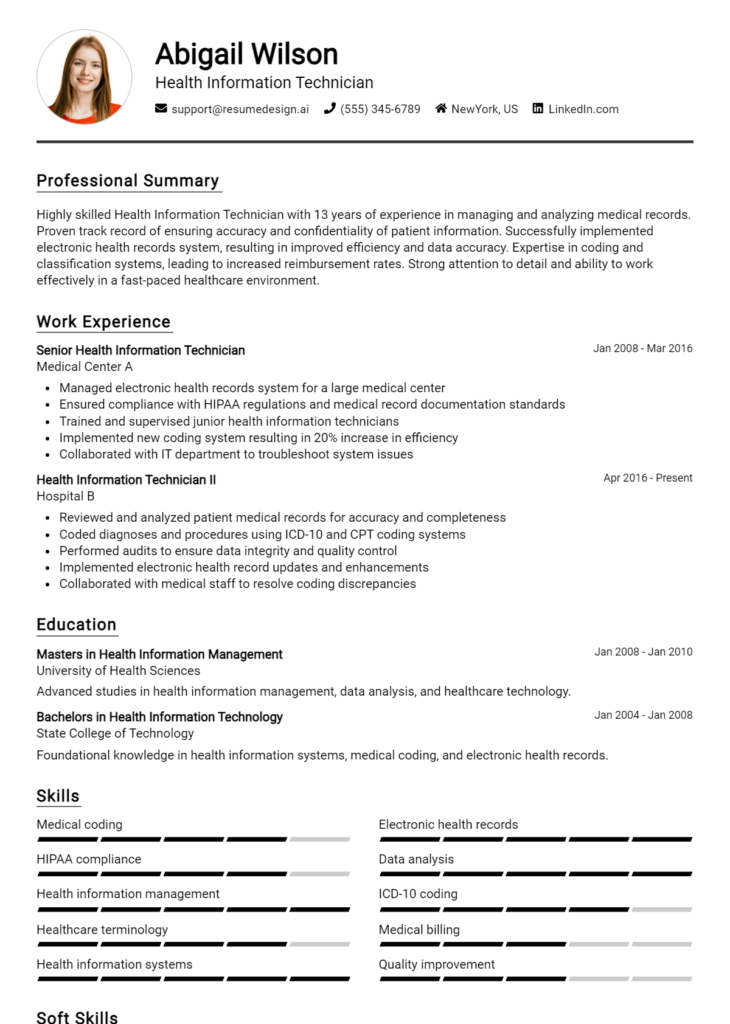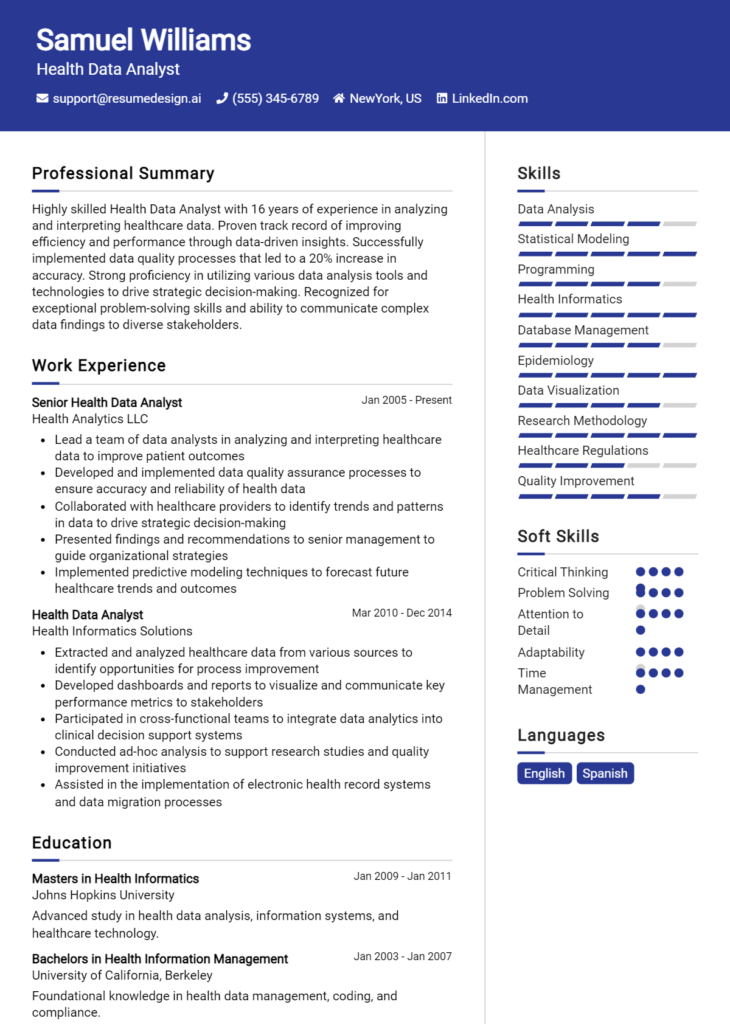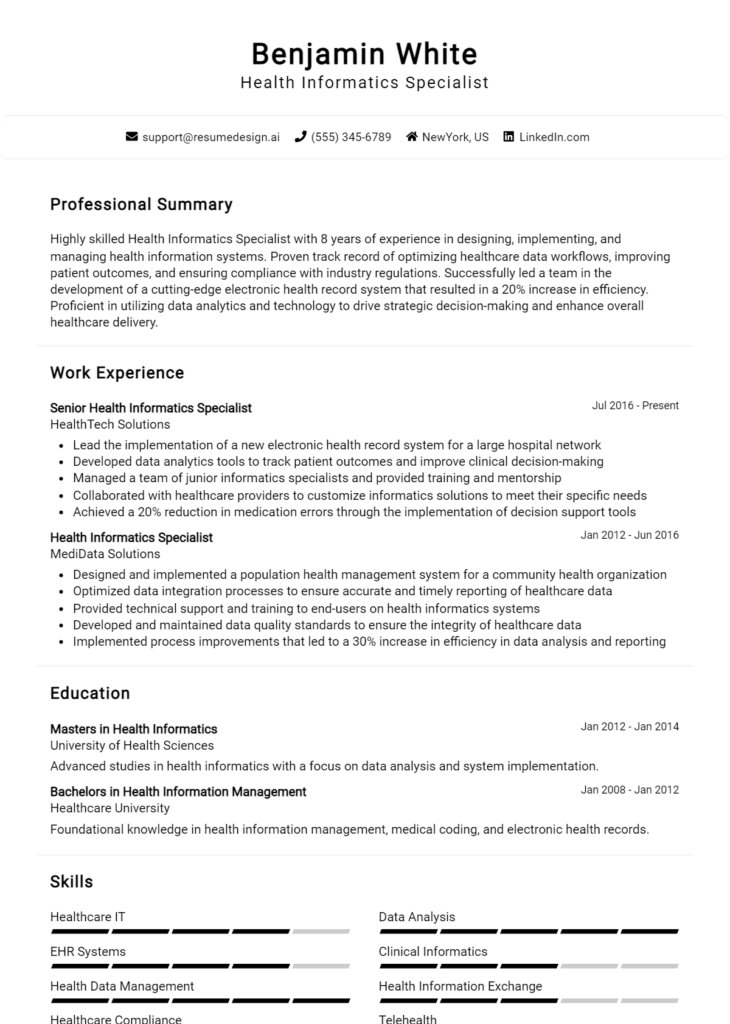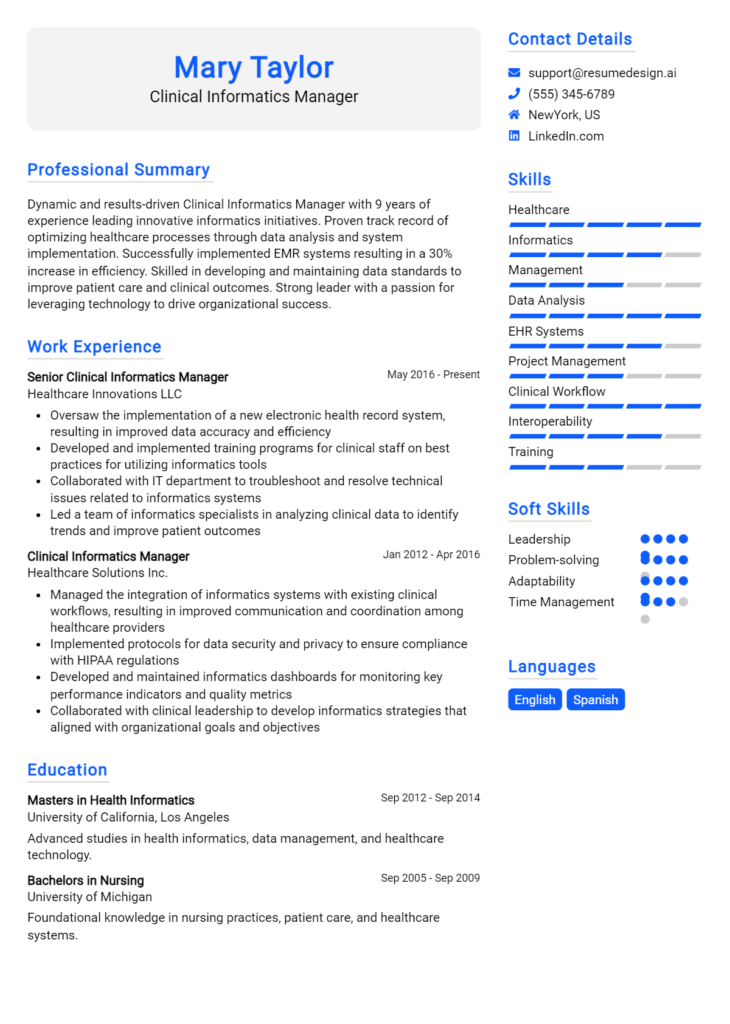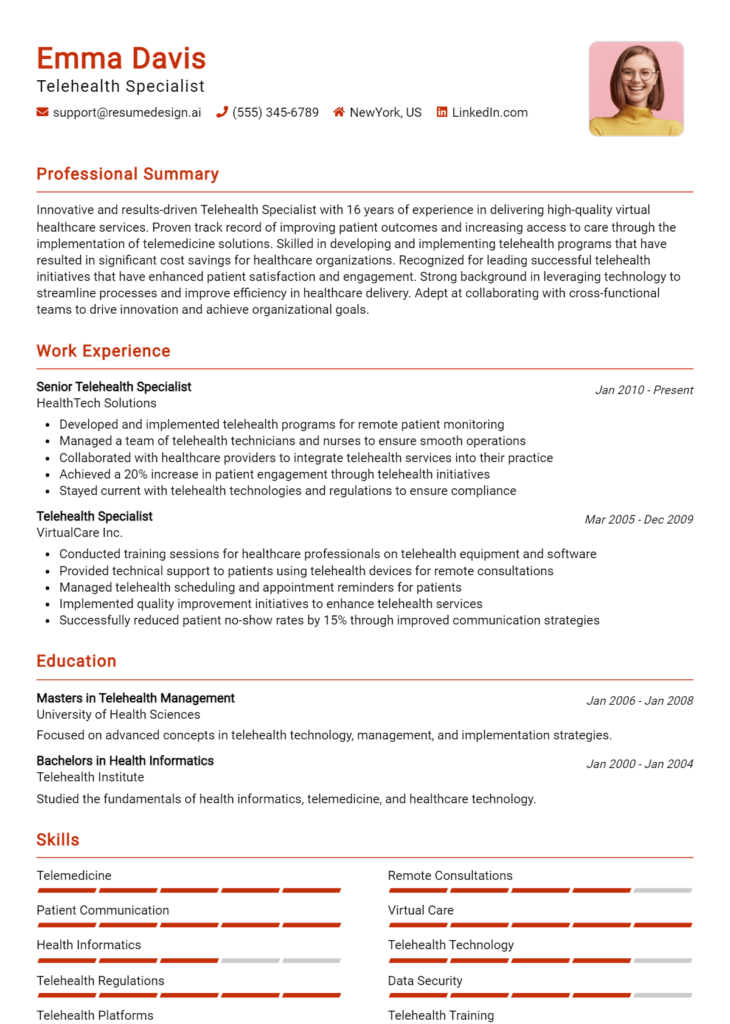Medical Software Developer Core Responsibilities
A Medical Software Developer plays a crucial role in the healthcare industry by designing, developing, and maintaining software applications that improve patient care and streamline operations. This position requires a blend of technical expertise, operational understanding, and strong problem-solving skills to effectively bridge the gap between IT and medical staff. Proficiency in programming languages, database management, and compliance with healthcare regulations is essential. A well-structured resume that highlights these qualifications can significantly enhance career opportunities and contribute to the organization's overall goals.
Common Responsibilities Listed on Medical Software Developer Resume
- Design and develop medical software applications to enhance patient care.
- Collaborate with healthcare professionals to gather requirements and ensure usability.
- Conduct software testing and quality assurance to ensure compliance with regulations.
- Maintain and update existing software applications based on user feedback.
- Integrate software solutions with existing healthcare systems and databases.
- Provide technical support and troubleshooting for software-related issues.
- Document software specifications, processes, and user manuals.
- Stay updated on industry trends and advancements in medical technology.
- Participate in cross-functional teams to enhance product development.
- Ensure data security and patient confidentiality in software solutions.
- Develop training materials and conduct training sessions for end-users.
High-Level Resume Tips for Medical Software Developer Professionals
In the competitive field of medical software development, a well-crafted resume serves as a critical gateway to securing job opportunities. It is often the first impression a candidate makes on a potential employer, and thus it must effectively reflect both the candidate's technical skills and notable achievements. A tailored resume not only showcases a developer's qualifications but also their understanding of the unique demands of the healthcare industry. This guide will provide practical and actionable resume tips specifically designed for medical software developer professionals, empowering you to stand out in a crowded job market.
Top Resume Tips for Medical Software Developer Professionals
- Tailor your resume to each job application by incorporating keywords from the job description.
- Highlight relevant experience in medical software development, particularly projects that align with the prospective employer's focus areas.
- Quantify your achievements to provide concrete evidence of your impact, such as "Improved application performance by 30%."
- Showcase your proficiency in industry-specific programming languages and tools, such as C#, Java, or Python.
- Include certifications or training relevant to healthcare regulations, such as HIPAA compliance or FDA guidelines.
- Demonstrate your understanding of both software development processes and healthcare workflows.
- Incorporate soft skills that are essential in the medical field, such as teamwork, communication, and problem-solving abilities.
- Keep your resume format clean and professional, ensuring easy readability for hiring managers.
- Utilize a professional summary that succinctly outlines your key qualifications and career goals in medical software development.
- Proofread your resume to eliminate any grammatical errors or typos, as attention to detail is crucial in software development.
By implementing these tips, you can significantly enhance your resume's effectiveness, increasing your chances of landing a job in the medical software developer field. A focused and polished resume will not only highlight your technical capabilities but also demonstrate your commitment to meeting the industry's unique challenges, making you a compelling candidate for potential employers.
Why Resume Headlines & Titles are Important for Medical Software Developer
In today's competitive job market, a Medical Software Developer's resume must stand out to attract the attention of hiring managers. The resume headline or title serves as a powerful introduction, summarizing the candidate's key qualifications in a succinct and impactful manner. A strong headline can immediately captivate hiring managers, allowing them to quickly assess the applicant's suitability for the role. It should be concise, relevant, and directly related to the job being applied for, encapsulating the essence of the candidate’s skills and experience in a single phrase.
Best Practices for Crafting Resume Headlines for Medical Software Developer
- Keep it concise: Aim for a headline that is no longer than 10-12 words.
- Be specific: Use keywords that are relevant to the Medical Software Developer role.
- Highlight key skills: Focus on the most critical skills or technologies you possess.
- Showcase your experience: Include years of experience or notable achievements when applicable.
- Use action-oriented language: Start with strong verbs or descriptors to convey confidence.
- Tailor for each application: Customize your headline for the specific job you are applying to.
- Maintain professionalism: Ensure the tone and language are professional and industry-appropriate.
- Consider the employer's perspective: Think about what would grab a hiring manager's attention.
Example Resume Headlines for Medical Software Developer
Strong Resume Headlines
"Innovative Medical Software Developer with 5+ Years in HealthTech Solutions"
"Experienced Full-Stack Developer Specializing in Medical Applications and Compliance"
"Results-Driven Medical Software Engineer with Proven Track Record in Agile Development"
Weak Resume Headlines
"Software Developer Looking for Opportunities"
"Experienced Professional in Software Development"
Strong resume headlines are effective because they convey specific strengths and experiences that directly relate to the Medical Software Developer role, making it easy for hiring managers to see the candidate's fit for the position. In contrast, weak headlines fail to impress due to their vagueness and lack of relevant detail, leaving hiring managers with little insight into the candidate's qualifications or potential contributions to their team.
Writing an Exceptional Medical Software Developer Resume Summary
A resume summary is a vital component for a Medical Software Developer, serving as the first impression a candidate makes on hiring managers. This concise statement quickly captures attention by highlighting key skills, relevant experience, and significant accomplishments tailored to the specific job application. A well-crafted summary not only showcases a candidate's technical prowess but also emphasizes their ability to contribute to innovative healthcare solutions, making it an essential tool for standing out in a competitive job market.
Best Practices for Writing a Medical Software Developer Resume Summary
- Quantify achievements: Use numbers to demonstrate the impact of your work, such as reduced processing time or improved software efficiency.
- Focus on relevant skills: Highlight key technical skills that align with the job requirements, such as programming languages, software development methodologies, and healthcare compliance knowledge.
- Tailor the summary: Customize your summary for each job application, ensuring it reflects the specific qualifications and experiences that the employer is seeking.
- Use action verbs: Start sentences with dynamic verbs to convey a sense of initiative and achievements.
- Keep it concise: Aim for 3-5 sentences that provide a snapshot of your qualifications without overwhelming the reader.
- Highlight industry knowledge: Mention familiarity with healthcare regulations, standards, and technologies that are relevant to the medical software field.
- Showcase collaboration skills: Emphasize experience working with cross-functional teams, particularly in project management or software development environments.
- Incorporate keywords: Use industry-specific terminology that aligns with the job description to optimize your summary for Applicant Tracking Systems (ATS).
Example Medical Software Developer Resume Summaries
Strong Resume Summaries
Detail-oriented Medical Software Developer with over 5 years of experience in creating robust healthcare applications. Successfully reduced processing time by 30% through the implementation of optimized algorithms and enhanced user interfaces, improving patient satisfaction scores significantly.
Results-driven software engineer specializing in medical applications, with a proven track record of leading projects that adhere to HIPAA regulations. Developed a telemedicine platform that increased remote patient consultations by 40% within the first year of launch.
Innovative Medical Software Developer with expertise in Python and Java, skilled in developing user-friendly solutions that meet stringent healthcare standards. Achieved 95% user adoption rates for newly launched EHR systems, streamlining patient data management.
Weak Resume Summaries
An experienced software developer looking for opportunities in the medical field. I have worked on various projects and am eager to contribute to a healthcare company.
Passionate about software development with a focus on healthcare. I possess skills in programming and am interested in working with healthcare applications.
The strong resume summaries are effective because they provide specific achievements, quantify results, and directly relate to the skills and experiences necessary for the Medical Software Developer role. In contrast, the weak summaries lack detail and specificity, making them too generic and failing to capture the candidate's unique qualifications or impact on past projects.
Work Experience Section for Medical Software Developer Resume
The work experience section of a Medical Software Developer resume is critical, as it serves as a testament to the candidate's technical abilities and their aptitude for managing teams and delivering high-quality software products. This section not only highlights the candidate's hands-on experience with relevant technologies and methodologies but also showcases their capacity to navigate the complexities of the healthcare industry. By quantifying achievements and aligning work experience with industry standards, candidates can effectively demonstrate their value to potential employers, making it essential to present this information with clarity and precision.
Best Practices for Medical Software Developer Work Experience
- Focus on relevant technical skills: Highlight programming languages, software development frameworks, and tools specific to the medical industry.
- Quantify achievements: Use metrics such as the percentage of errors reduced, time saved in processes, or user adoption rates to illustrate success.
- Emphasize collaboration: Detail experiences in team settings, particularly cross-functional collaboration with healthcare professionals.
- Showcase problem-solving abilities: Include examples where you identified and resolved specific challenges within software development.
- Align with industry standards: Reference compliance with regulations such as HIPAA or FDA guidelines to demonstrate industry knowledge.
- Use action verbs: Start bullet points with strong action verbs to convey impact and initiative, such as "developed," "led," or "implemented."
- Tailor content for each application: Customize the work experience section to reflect the job description and required skills of each position applied for.
- Highlight leadership roles: If applicable, underline any positions where you led a team, including mentoring or training responsibilities.
Example Work Experiences for Medical Software Developer
Strong Experiences
- Led a team of 5 developers to create a telehealth application, resulting in a 40% increase in patient engagement and a 30% reduction in appointment no-shows.
- Implemented an automated testing framework that decreased software release times by 25% while improving code quality, leading to a 15% reduction in post-launch defects.
- Collaborated with healthcare professionals to redesign an electronic health record (EHR) system, improving user satisfaction scores by 50% within six months post-launch.
Weak Experiences
- Worked on software development projects.
- Assisted with coding tasks as needed.
- Participated in team meetings and discussions.
The examples provided illustrate the distinction between strong and weak experiences. Strong experiences are characterized by specific, quantifiable outcomes that highlight the candidate's technical leadership and collaborative efforts in a healthcare-focused environment. Conversely, weak experiences lack detail and measurable achievements, making it difficult for potential employers to gauge the candidate's impact or contributions to previous roles. A well-crafted work experience section can significantly enhance a resume by showcasing a candidate's expertise and accomplishments in a compelling manner.
Education and Certifications Section for Medical Software Developer Resume
The education and certifications section of a Medical Software Developer resume plays a crucial role in showcasing a candidate's academic foundation, industry-related credentials, and commitment to ongoing professional development. This section not only provides insight into the individual’s knowledge and skills but also indicates their ability to stay current with the rapidly evolving field of medical technology. By detailing relevant coursework, certifications, and specialized training, candidates can significantly enhance their credibility and demonstrate alignment with the specific requirements of the medical software development role.
Best Practices for Medical Software Developer Education and Certifications
- Prioritize relevant degrees such as Computer Science, Software Engineering, or Biomedical Engineering.
- List industry-recognized certifications such as Certified Software Development Professional (CSDP) or Health Informatics Certification.
- Include coursework that directly relates to medical software, such as Health Informatics, Data Structures, and Software Testing.
- Highlight any specialized training programs or boot camps focused on medical software development or health technologies.
- Indicate the level of expertise for each certification or course to showcase proficiency.
- Keep the section concise and focused, avoiding irrelevant degrees or outdated certifications.
- Use clear formatting to make the information easily scannable for hiring managers.
- Regularly update this section with new qualifications to reflect continuous learning and adaptation to industry standards.
Example Education and Certifications for Medical Software Developer
Strong Examples
- Bachelor of Science in Computer Science, Stanford University
- Certified Health Informatics Systems Professional (CHISP)
- Coursework in Medical Software Development, Data Analysis, and Machine Learning for Healthcare.
- Certification in Agile Software Development from the Scrum Alliance.
Weak Examples
- Associate Degree in General Studies, Community College
- Certification in Microsoft Office Applications
- Coursework in Basic HTML and CSS
- Outdated Certification in Computer Programming from 2010
The examples provided illustrate the distinction between strong and weak qualifications. Strong examples are directly relevant to the medical software development field, reflecting both technical expertise and specialized knowledge necessary for the role. In contrast, weak examples demonstrate a lack of focus on applicable skills and knowledge, as they pertain to general studies or outdated certifications that do not align with current industry demands.
Top Skills & Keywords for Medical Software Developer Resume
In the rapidly evolving field of healthcare technology, the role of a Medical Software Developer is critical for ensuring that medical applications and systems function effectively and safely. A well-crafted resume highlighting relevant skills can significantly enhance a candidate's chances of landing an interview. Skills not only demonstrate a candidate's technical competence but also their ability to collaborate with healthcare professionals, understand regulatory requirements, and contribute to the overall goal of improving patient care through innovative software solutions. Therefore, it is essential for Medical Software Developers to showcase a balanced mix of both hard and soft skills that reflect their expertise and adaptability in this specialized field.
Top Hard & Soft Skills for Medical Software Developer
Soft Skills
- Strong communication skills
- Problem-solving ability
- Team collaboration
- Attention to detail
- Time management
- Adaptability
- Critical thinking
- Empathy towards end-users
- Project management
- Leadership capabilities
Hard Skills
- Proficiency in programming languages (e.g., Java, C#, Python)
- Knowledge of healthcare regulations (e.g., HIPAA, FDA)
- Experience with software development methodologies (e.g., Agile, Scrum)
- Familiarity with medical device software standards (e.g., IEC 62304)
- Database management skills (e.g., SQL, NoSQL)
- Understanding of cloud computing and services (e.g., AWS, Azure)
- API development and integration
- Expertise in version control systems (e.g., Git)
- Knowledge of user interface (UI) and user experience (UX) design principles
- Experience with electronic health record (EHR) systems
By integrating these skills into your resume, along with relevant work experience, you can create a compelling portrait of your qualifications that aligns with the needs of potential employers in the medical technology industry.
Stand Out with a Winning Medical Software Developer Cover Letter
As a passionate Medical Software Developer with over five years of experience in designing and implementing innovative healthcare solutions, I am excited to apply for the position at [Company Name]. My background in both software engineering and healthcare has equipped me with the unique ability to bridge the gap between technology and patient care. I am particularly drawn to your company’s commitment to improving patient outcomes through cutting-edge software applications, and I am eager to contribute my expertise to your team.
Throughout my career, I have successfully developed and maintained various medical applications, including electronic health records (EHR) systems and telemedicine platforms. My proficiency in programming languages such as Python, Java, and C# has enabled me to create user-friendly interfaces and robust back-end systems that enhance operational efficiency. In my previous role at [Previous Company Name], I led a team in the development of a patient management system that improved appointment scheduling by 30% and increased patient satisfaction ratings significantly. I believe that my strong analytical skills and attention to detail will enable me to deliver high-quality software that meets the needs of both healthcare providers and patients.
Moreover, my experience collaborating with cross-functional teams, including healthcare professionals and compliance experts, has honed my ability to understand regulatory requirements such as HIPAA and GDPR. I am adept at conducting thorough testing and validation processes to ensure that all software solutions comply with industry standards and deliver a seamless user experience. I am excited to bring this collaborative spirit and dedication to quality assurance to [Company Name], helping to create software that not only meets the technical requirements but also supports the mission of providing exceptional patient care.
I am thrilled about the opportunity to join [Company Name] and contribute to your innovative projects. I am confident that my skills and experience will make a meaningful impact on your team. Thank you for considering my application; I look forward to the possibility of discussing how I can help advance your mission in the healthcare technology space.
Common Mistakes to Avoid in a Medical Software Developer Resume
When crafting a resume for a Medical Software Developer position, it's crucial to showcase not only your technical skills but also your understanding of the healthcare industry. However, many candidates often make common mistakes that can hinder their chances of landing an interview. By avoiding these pitfalls, you can create a compelling and professional resume that highlights your qualifications and experience effectively.
Neglecting Tailoring: Failing to customize your resume for each specific job application can lead to a generic impression. Tailoring your resume shows that you understand the company's needs and how your skills align with their goals.
Overemphasizing Technical Jargon: While it's important to showcase technical skills, using too much jargon can confuse hiring managers who may not have a technical background. Aim for clarity and accessibility in your language.
Ignoring Compliance Knowledge: The healthcare industry is heavily regulated, and neglecting to mention your familiarity with compliance standards like HIPAA or FDA regulations can be a missed opportunity to demonstrate your industry knowledge.
Listing Responsibilities Instead of Achievements: Simply outlining your job responsibilities doesn't convey your impact. Focus on quantifiable achievements that demonstrate how your contributions improved processes or outcomes.
Omitting Soft Skills: Medical software development often requires collaboration with healthcare professionals and teams. Omitting soft skills like communication and teamwork can give the impression that you may struggle in a collaborative environment.
Using a Generic Format: A resume that lacks a clear, professional format can detract from your qualifications. Ensure your resume is well-organized and visually appealing to make a strong first impression.
Failing to Include Relevant Projects: Not highlighting relevant projects or contributions to open-source software can prevent you from showcasing your hands-on experience in medical software development.
Skipping Keywords: Many companies use Applicant Tracking Systems (ATS) to filter resumes. Failing to include relevant keywords from the job description can result in your resume being overlooked.
Conclusion
As a Medical Software Developer, your role is crucial in bridging the gap between healthcare and technology, ensuring that software solutions are both effective and compliant with industry standards. Throughout this article, we explored the essential skills required for this position, such as proficiency in programming languages, understanding of healthcare regulations, and the ability to collaborate with medical professionals to create user-friendly applications.
We also highlighted the importance of continuous learning in this fast-evolving field, including staying updated on new technologies and methodologies that can enhance patient care. Furthermore, the impact of your work on improving healthcare outcomes cannot be overstated, as you play a key role in developing systems that streamline processes and improve patient experiences.
In conclusion, it's vital for Medical Software Developers to present themselves effectively through their resumes. Take a moment to review and refine your Medical Software Developer resume to ensure it reflects your unique skills and experiences. To assist you in this process, consider utilizing tools such as resume templates, a resume builder, resume examples, and cover letter templates. These resources can help you craft a standout application that showcases your qualifications and commitment to advancing healthcare through technology.

